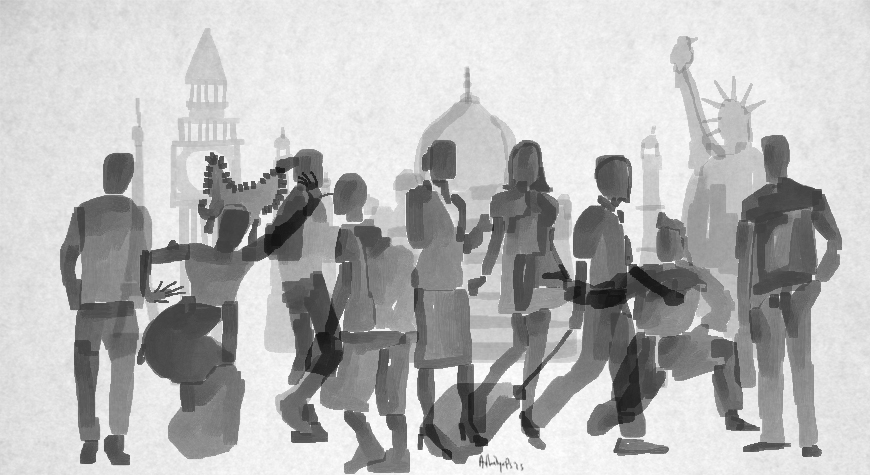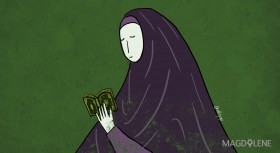They ever ask you, "Where you from?"
Like, "Where you really from?"
The question seems simple, but the answer's kinda long.
The line above is the lyrics of a song by Riz Ahmed, a British Pakistani rapper and actor. In early 2020, he released his latest album, The Long Goodbye. There is one particular song or rather a monologue that caught my attention, “Where you From.” When I was listening to this piece of work, for the first time, I felt heard. There is someone out there who understands me and my struggle. It felt like Riz Ahmed, a famous artist from Britain, created the song for people like me, who're doomed to have their identity questioned daily. I might not understand his struggle as a brown boy growing up in Britain, but he sure does understand mine, a young brown woman from Indonesia.
We Indonesians always have one main question that must be asked when we meet someone new: "Where are you from?" I have lost count of how many people have asked me this question in my life. It sounds simple, but to me it is traumatizing and sickening. Like Riz Ahmed said, “the question seems simple, but the answer's kinda long.”
Nobody has to tell that I’m different – I’ve known it all my life. I am part of the 0.07 percent of the “other” ethnic groups in Indonesia. Different ethnicity, different skin complexion, religion, custom, and cultures. Even the breakfast meals in my house are different than most households’.
My great grandparents from my mother's side and my grandparents from my father's side came from a province in Northern India called Punjab. Back then, when India was still ruled by Britain, religious sentiment was heating up, as well as the increasingly uncertain economic conditions. Their land couldn’t produce food. They came for a better life to Indonesia in the early 1920s to look for a better future for their family. Seventy-six years later, I was born, a second-generation Indian who would remain stuck in diaspora in her own home country, Indonesia.
In elementary school, one of my friends once advised me to try a skin whitening product. Apparently she wanted my skin to be lighter, so I would be more suitable to hang out with them as a fellow light skinned person.
How could an elementary school child think that light-complexion is much better than dark-colored skin? Who planted this idea in their head? Unfortunately, she was not alone in this thinking. Many people believe that fair skin is superior to dark skin, a legacy from centuries of colonization. South Asian descendants are not the only one having problems with the issues. Our fellow Eastern Indonesian brothers and sisters constantly face discrimination, biases and humiliation for their skin color.
After school years, things got worse for me. In the real world, I came to see how cruel people can be. While people in my neighbourhood and the school have accepted me over the years, people out there are not. I feel their eyes burning into my skin every time I walk to the bus stop. Some people would start to sing Bollywood songs or dance on the roadside. Some asked me to sing or dance every time I passed a tree or pole.
Once in a while, some would shout "Kajol!" at me. I supposed I could just see it as a compliment; she is a beautiful actress after all. But I have my own identity. Most terrible of all is those who put a lot of effort to get my attention by continuously singing or calling out names or racial slurs. The more enthusiastic they are, the faster I walk away from them. But the harm can't be undone. It makes me afraid. Afraid to be different.
Then there are those people I have just met me would ask, "Where you from?" I always struggle to give them the right answer. I don't want to be perceived differently. After all, I'm one of them, right? Then I start to think, what is it that they actually want to know? Where was I born? North Sumatra. Where do I live? Jakarta. What is my nationality? Indonesia. How about my race? Indo-Aryan. My ethnicity? India – Punjabi, to be precise.
Why do they still laugh at my answer, when I'm telling them the truth. It seems like they're not satisfied with my response – like they want me to answer “India” to prove that I'm not one of them and that I'm different.
But I'm not. I'm a young Indonesian-born Indian. I sang Indonesia Raya every Monday at my school assembly. My mother cooks better sambal than most of the restaurant I know, and my father cares about this country more than most of our parliament members. But I guess it's not enough. I'm still different – not Indonesian – so people continue to ask me that dreaded question: “Where are you from?”
Maybe the next time someone asks me that, I will answer in Riz Ahmed's styles, "Where I'm from is not your problem, bruh!”







Comments